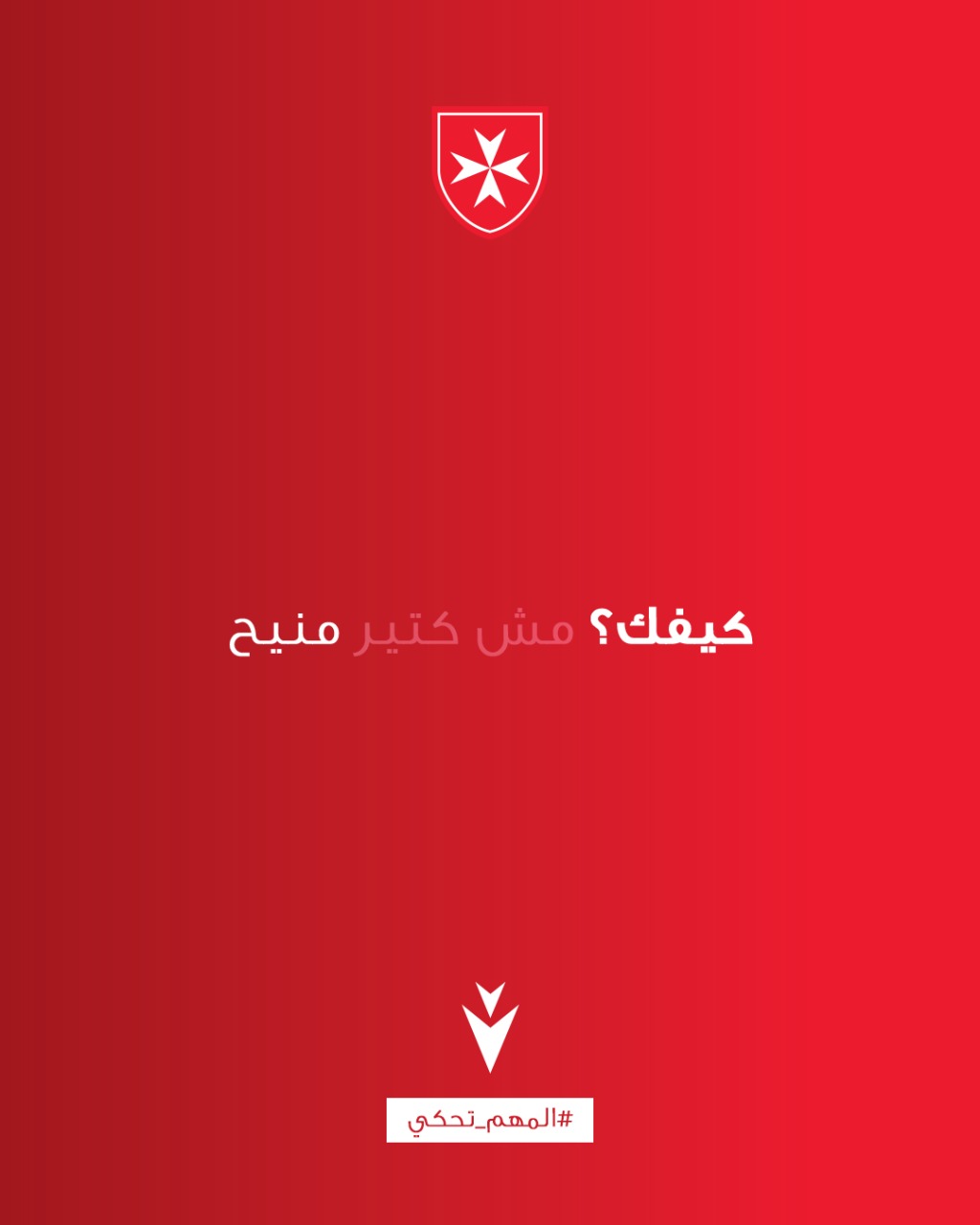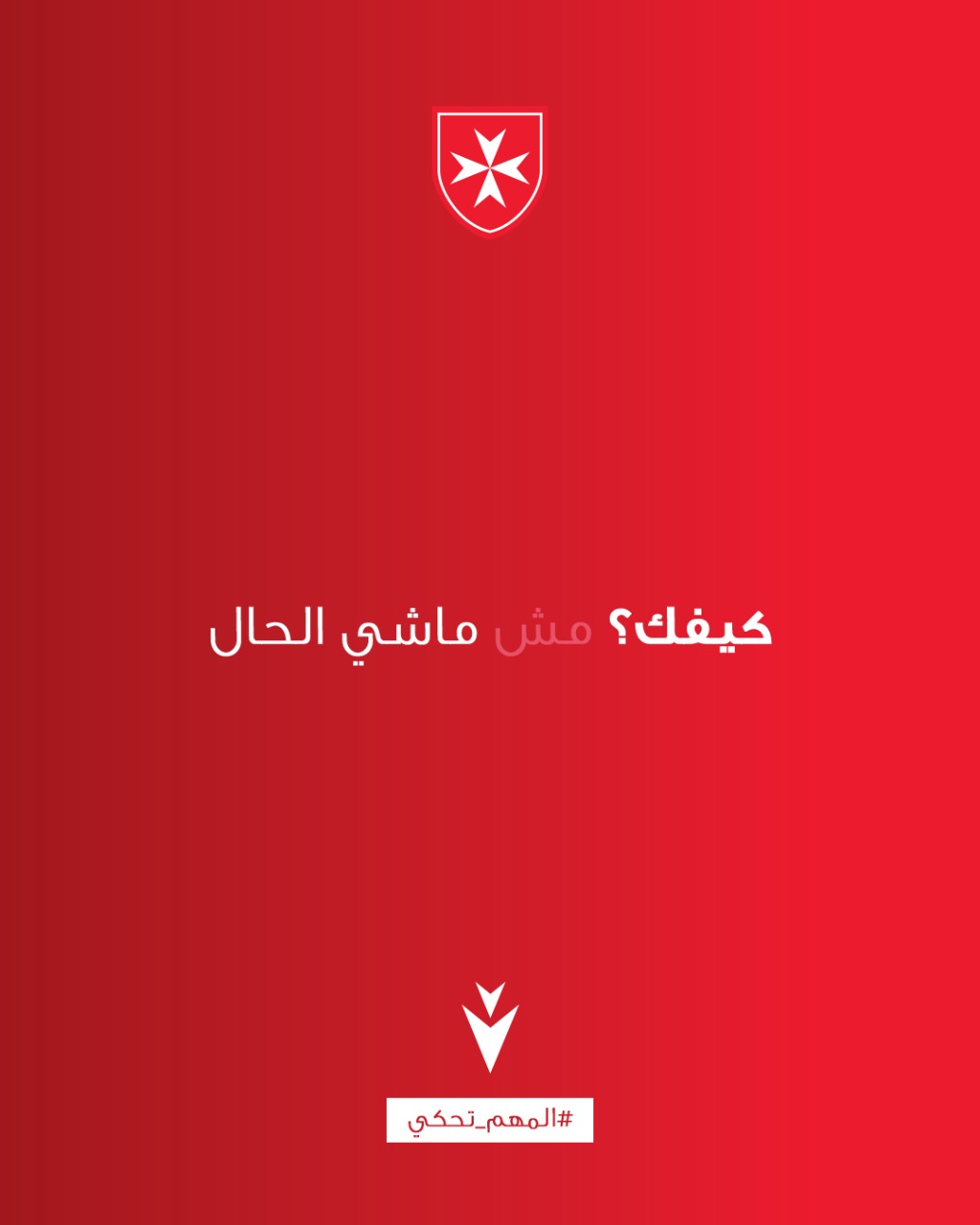“Tell Us…How You Really Feel?”
BEIRUT, April 14, 2021 – Against the backdrop of the crisis-ridden situation in Lebanon and its detrimental effects on the various societal strata, the Order of Malta Lebanon has launched the “Tell Us.. How You Really Feel?” mental health campaign in collaboration with Saint Joseph University of Beirut (USJ). Doctors and psychiatrists from both the Order and USJ are taking part in this initiative, which is funded by the German Federal Ministry for Economic Cooperation and Development (BMZ) and supported by Malteser International (MI).

The campaign aims to deconstruct social stigma associated with psychiatric and mental illnesses and related stereotypes. It also aims to raise community awareness on the importance of seeking professional mental health support when necessary, as well as turning to the family doctor, the Order’s community health centers, family and close friends to share our anxieties as means for emotional relief and to alleviate the weight of our worries and fears. This is especially true given the impact of post-traumatic stress disorder (PTSD) generated by the spiraling crises that are currently plaguing Lebanon. Levels of stress and anxiety are on the rise caused by the successive adversities hitting Lebanon, particularly in the aftermath of the Beirut Port explosion and the sharp economic downturn, not to mention the implications of the lockdown and quarantine to prevent the spread of COVID-19.
The campaign sheds the light on the role of psychologists and psychiatrists as well as the importance of consulting a physician before resorting to self-medicating with antidepressants and sedatives. Adopting a proximity approach, the Order of Malta Lebanon went to the streets and asked individuals of different socioeconomic and age groups about the state of their mental wellbeing, in light of the deteriorating economic, health and living conditions. These testimonies were later transferred to mental health experts at USJ, and as a result, six conditions were identified, representing the main disorders that the Lebanese complained about, which became the campaign themes.
The themes are: depression, anxiety, insomnia, negative coping mechanisms, as well as various behavioral and emotional disorders in children and adolescents (hyperactivity, strained child/parent interactions, lack of concentration, lack of communication with others as a result of remote learning and prolonged use of technological devices, and disrupted daily routines).
The campaign’s objectives are showcased in six one minute awareness films that voice people’s concerns and provide guidance and education on each of the abovementioned subjects, their causes and how to address them. These topic are followed by in-depth discussions during a television morning program where mental health experts and doctors will offer advice and tips on how to manage symptom-related challenges.
The campaign goes beyond awareness-raising. It also offers referrals to the Order of Malta Lebanon community health centers, which are part of the National Primary Healthcare Program, or to any of their partners’ centers. The Order is continuously scaling up its services to embrace mental health thanks to the help of trained professionals. Patients will be able to turn to nurses, social workers or general practitioners who are on hand to determine symptoms and provide diagnosis. And if necessary, patients will be referred to specialists.
“People have always been at the core of our efforts which seek to improve their livelihoods and maintain their wellbeing. The Order has dedicated itself to mitigating the suffering of all groups and catering to their evolving needs, including mental health. Our partnership with USJ is crucial today in forging a culture of collaboration and knowledge-sharing in the face of the unprecedented challenges,” said Oumayma Farah, PR & Communications Director at the Order of Malta Lebanon.

“Mental health is part of a series of new services launched by the Order in its centers to round out its health, social and humanitarian provisions, especially in the context of the severe socioeconomic and healthcare pressures currently experienced in Lebanon. Hospitals are buckling under the daily strain exerted on their medical and nursing staff, amid an unprecedented wave of emigration of medical professionals, rising numbers of COVID-19 cases, and the lifting of subsidies on some medications while others have become unavailable. As for the food sector, steadily increasing prices have threatened the population’s food security, compounded by the soaring levels of poverty, unemployment and other hardships, all of which have exacerbated the mental strain and distress of the national and resident populations,” she noted, adding that “the campaign aspires to enable and encourage individuals to speak up and seek mental health support through our nine centers and their qualified medical teams, or to refer them to our partners’.”
USJ’s Head of Psychiatry Department, Prof. Sami Richa, lauded “the knowledge-based partnership that links us as an active academic institution with the Order of Malta Lebanon. This close collaboration constitutes a cornerstone for intersectional efforts that cut across humanitarian, health and social fieldwork on one hand and the specialized medical field on another, towards educating the public on psychiatric and mental health as an integral part of physical health.”
He observed that the campaign aimed at society as a whole “is a clear reflection of Saint Joseph University’s social commitment manifested in investing its medical expertise and resources to supporting and tending to the concerns of the Lebanese society suffering today from many psychological pressures owing to the crises Lebanon is going through.”






